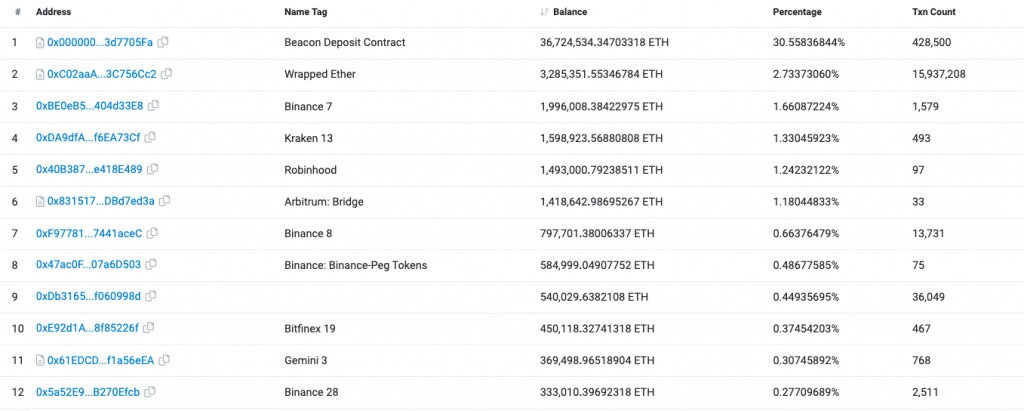- >News
- >Who Are the Biggest Ethereum Holders? The ETH Rich List
Who Are the Biggest Ethereum Holders? The ETH Rich List
Big names are often attached to various digital assets. Elon Musk and his Tesla company are tied to Dogecoin and Bitcoin, respectively. The Winklevoss twins, who own Gemini Exchange, and Michael Saylor’s company Microstrategy are two other big names in Bitcoin.
When it comes to Ethereum however, not as much publicity is given to the largest holders of ETH or an Ethereum whales list.
Thankfully, when looking at an Ethereum block explorer such as EtherScan, it’s easy to see who owns the most Ethereum. The biggest Ethereum holders are often not individuals as we’ll see, but there are certainly some ETH whales just as there are Bitcoin ones.
Ethereum on Other Networks
With Ethereum being as popular as it is for a variety of uses, such as staking, DeFi, and investing, it has spread to more networks than just its own. There are pegged versions of Ethereum on blockchains such as Cronos (CRO), Binance Smart Chain (BSC), and Cardano (ADA). There is also Ethereum on Layer-2s (L2s) which are built on top of Ethereum’s base layer such as Polygon (MATIC), Arbitrum (ARB), and Optimism (OP). These L2s often hold a fair amount of ETH either on bridges or on DeFi platforms.
Biggest Companies, Individuals, and Investors Holding Ethereum
Ethereum, as the second largest digital asset by market cap, is probably the most common asset available on every crypto exchange other than Bitcoin. As such is the case, who owns the most Ethereum is often an exchange or smart contract, but below we’ll outline some of the exchanges that are whales, along with individuals, and protocols. Let’s see the Ethereum rich list.
EhterScan as of January 2024
Grayscale Ethereum Trust
Though not contained in a single wallet address, Grayscale is the entity who owns the most Ethereum in the world. They hold over 3 million ETH across various addresses for their Grayscale Ethereum Trust ETF product, which they’re hoping to convert to an open ended ETF product like they recently did with their Bitcoin ETF.
Vitalik Buterin

Vitalik Buterin, one of the founders of Ethereum along with Gavin Wood (Polkadot) and Charles Hoskinson (Cardano), has many ETH addresses, but his VB 3 address is the largest. He currently holds over 244,000 ETH at this address, having sent 320,000 from his main VB wallet just under 2 years ago. This is well over $400 million USD in ETH, and certainly makes Buterin one of the largest owners of Ethereum. If you add his other known wallet addresses, he has over 270k ETH.
Beacon Chain Contract
The Beacon Chain contract is the contract that was used by Ethereum during the switch from proof of work to proof of stake, which culminated with the successful Merge phase in fall 2022. Ethereum holders were able to stake their Ethereum to this address in order to earn rewards once the switch to proof of stake was complete. Many big exchanges such as Coinbase and Binance pooled users ETH to stake to this contract, which is still being executed. It tops the Ethereum whales list as the largest holder of ETH with over 36 million ETH in the contract.
Wrapped ETH Contract
Wrapped ETH (WETH) is another popular contract. ETH itself isn’t an ERC-20 token, making it difficult to use with DeFi applications such as Uniswap, so the developers came up with a way to “wrap” Ethereum to make it an ERC-20 token. This allows it to be used in a variety of apps. It has no price difference to regular ETH, it’s just more functional. The WETH contract is the second largest Ethereum holder with over 3.2 million ETH.
Binance
It should be no surprise that the world’s largest exchange by trading volume is also one of the largest holders of ETH. It may be surprising to realize that if you add up just 3 of the main Binance ETH addresses, they’re in fact the second largest holder of ETH, with over 3.3 million held. There are Binance 7, 8, and 28 addresses which are exchange wallets used for various exchange features, along with their Binance-Peg Tokens address. This is where the ETH is stored when Binance Smart Chain (BSC) users bridge their ETH to the BSC. It’s held at this Peg address until the ETH is withdrawn from the BSC back to Ethereum. Address 7, 8, and the peg address are all top 10 holders individually, while Binance 28 is 12th.
Gemini
Gemini Exchange is owned by the Winklevoss Twins and comes in as the 9th largest holder of Ethereum as a single wallet address. There are over 400k ETH in the Gemini wallet address, making them one of the exchanges who has the most Ethereum.
Bitfinex
Bitfinex, another top exchange by trading volume, has three addresses in the top 20, totalling over 1 million ETH. There are two exchange wallets likely used for trading and exchange features, along with one multi-sig wallet which is likely their cold storage wallet.
Kraken
Kraken, who was charged by the SEC for their ETH and various other staking options, is another exchange that’s a large ETH holder, coming in at 4th with over 1.5 million in their Kraken 13 wallet. Kraken is also one of the largest exchanges by trading volume, so there are likely more wallets with smaller amounts of ETH, as they aren’t in the top 100 wallet addresses.
Arbitrum Bridge
Arbitrum is one of the L2s mentioned earlier and its bridge contract has over 1.4 million ETH. This makes the bridge the 6th largest holder of ETH. Arbitrum is becoming more and more popular as a cheaper alternative to using Ethereum’s main layer, so this number could grow even more over time.
Robinhood
Robinhood, the commission-free trading app that has faced some controversy in the past for their halting of GameStop share trading, is the 5th largest Ethereum holder as an individual wallet address. They hold just under 1.5 million ETH.
Is Ethereum Well-Distributed?
Yes, Ethereum is fairly well distributed and therefore pretty well decentralized. Generally speaking, who owns the most Ethereum is often an exchange, fund, bridge, or DAO. Even though there are sizable holdings at these addresses, if you take away the Beacon and WETH contracts, no holder has more than 1.65% of the supply. This means there is no one that could maliciously attack the network, increasing its overall security.



